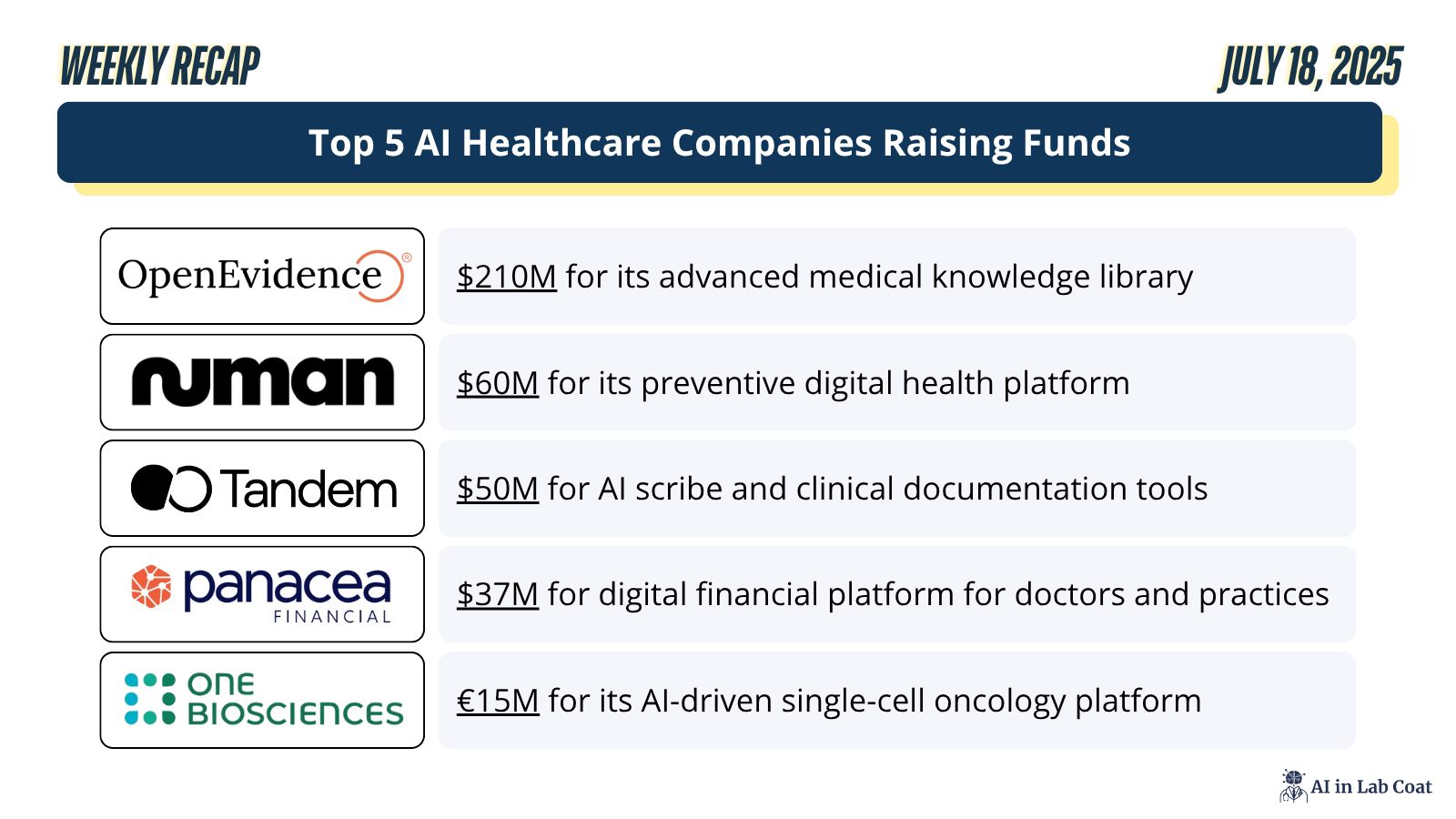
Happy Friday! It’s July 18th.
I don’t usually mention Apple and AI together, but this one is interesting... Apple is testing its new AI on the Watch that claims it can spot things like pregnancy just from your daily routine.
Honestly, I’m curious but a bit uneasy about how much our gadgets might soon know about us. A little too invasive, don’t you think? (Link at the bottom)
Our picks for the week:
Featured Research: AI Finds Antibiotics in Venom
Perspectives: AI Powers Remote Diagnostics
Product Pipeline: Heart Valve AI Gets FDA Nod
Policy & Ethics: U.S. Faces AI Policy Paralysis
Read Time: 4.5 minutes
FEATURED RESEARCH
AI Uncovers Hundreds of Potential Antibiotics in Snake, Spider, and Scorpion Venom

Five million people die from drug-resistant infections each year as antibiotic discovery has ground to a halt. Scientists at the University of Pennsylvania just made a breakthrough using AI to find new antibiotics hidden in venom.
AI Finds the Hidden: The team used their custom AI tool, APEX, to screen 40 million venom-derived peptides from snakes, spiders and scorpions. Of those, the model picked out 386 peptides with antibiotic properties, far exceeding manual research capabilities.
Lab testing showed 53 of the 58 synthesized peptides killed E. coli and MRSA without harming human cells.
Why Venoms? Venom peptides destroy bacteria by breaking down cell walls – a strategy hard for pathogens to overcome. Unlike regular antibiotics, which bacteria can evade and have built-in biological responses to resist them, venom-based medicines offer a new approach.
Next Steps: Several lead peptides successfully treated severe bacterial infections in mouse studies, reducing bacterial load with no toxicity. Now they’re optimizing those peptides to get to human antibiotics.
This AI-powered approach could help in the fight against drug-resistant bacteria, tapping into nature’s secret strength to protect public health.
For more details: Full Article
Brain Booster
Which animal’s venom is considered one of the most painful in the world, but almost never deadly to humans?
Select the right answer! (See explanation below)
Opinion and Perspectives
MULTIMODAL AI
Multimodal AI Will Shape the Future of Virtual Hospitals and Remote Diagnostics
Telehealth has opened up healthcare access for remote and underserved populations. But today’s telehealth solutions still have limitation. A big one being that clinicians don’t have access to an integrated patient database; it’s all fragmented data and single-source AI models compound this issue, missing crucial nuances in diagnosis.
Human diagnosis isn’t one-dimensional. Doctors combine imaging, patient history, physical exam, and clinical intuition. But current telehealth AI focuses on one data type, leaving huge gaps in patient care.
The power of multimodal AI: Multimodal AI combines multiple data sources, text, images, audio, video, wearable sensors, genomics, and electronic health records. This is the full scope of a traditional clinical environment, with faster and more accurate diagnosis and patient triage.
Virtual Hospitals: Imagine clinicians thousands of miles away reviewing data from wearable blood pressure, local clinic lab results, and remote imaging scans, all interpreted in real time by AI. Startups like Aidoc and PathAI are already using multimodal AI for niche diagnostics, a scalable model that can become the standard of care globally.
Ethical and Inclusive AI: But building multimodal AI requires high-quality, diverse datasets, robust partnerships, and algorithmic bias consideration. Only equitable and transparent AI can really improve healthcare and redefine patient access.
Multimodal AI isn’t replacing clinicians; it’s enabling them, scaling their expertise to create a digital and human healthcare.
For more details: Full Article
Top Funded Startups
Product Pipeline
HEART VALVE AI
FDA Approves World’s First AI Software for Real-Time Guidance of TAVI Procedures
Caranx Medical has received FDA clearance for TAVIPILOT Soft, the world’s first AI software providing real-time guidance during transcatheter aortic valve implantation (TAVI).
The platform tracks anatomical and device landmarks during procedures, helping cardiologists achieve safer and more accurate heart valve placement.
While 300,000 TAVI procedures are performed each year in the US and EU, there are more than 1.7 million patients who are waiting in line for this procedure.
TAVIPILOT Soft aims to broaden access by supporting less experienced centers and clinicians.
By making complex heart procedures safer and more predictable, Caranx’s AI is set to accelerate the adoption of TAVI and future cardiovascular innovations worldwide. Commercial launch in the US is expected by the end of 2025.
For more details: Full Article
Policy and Ethics
AI OVERSIGHT
Why America’s AI Health Policy Is Falling Behind Rapid Tech Adoption
This editorial from JAMA Health Forum warns of the dangers of inadequate oversight of rapidly advancing AI in healthcare.
As regulatory agencies see shrinking staff under the current Trump administration, they struggle to keep pace with technology. Without clear rules, profit-focused companies threaten to dictate how AI is developed and applied.
This poses risks to patients that could manifest in safety issues, unfair treatment, and a loss of faith in the system. For those receiving care, regulatory inaction may mean gaps will emerge regarding security, equality and trust, while Europe shows what proactive leadership could achieve.
The message is clear: If public bodies do not play an active, steady role in guiding AI's entrance into medicine, the costs of an unrestrained system are likely to outweigh any benefits it provides.
For more details: Full Article
Byte-Sized Break
📢 Three Things AI Did This Week
Delta is rolling out AI-powered personalized pricing to 20% of flights this year, using customer data to set fares, which has privacy advocates and lawmakers worried it could mean the end of cheap flights and less fair pricing for travelers.[Link]
San Jose Mayor Matt Mahan openly uses ChatGPT to prep speeches and draft city documents, aiming to train 1,000 city workers on AI tools by next year to boost productivity and cut down on busywork. [Link]
Apple is developing an AI feature for the Apple Watch that can detect pregnancy with up to 92% accuracy using behavior data. [Link]
Have a Great Weekend!

❤️ Help us create something you'll love—tell us what matters!
💬 We read all of your replies, comments, and questions.
👉 See you all next week! - Bauris
Trivia Answer: C. Bullet ant
The bullet ant, found in South America, delivers a sting so painful it’s said to feel like being shot, hence the name! Its venom causes intense burning and throbbing pain that can last for hours, but it’s rarely life-threatening.





